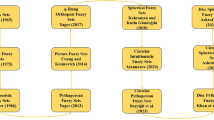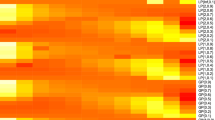Abstract
This article proposes a framework to deal with incomplete information in multiple criteria group decision making with intuitionistic fuzzy soft set. To do that, the weighted sum method for choice values and simple mathematical expectation method are extended to the case of obtained fuzzy soft set, and they are proved to have the same result in estimating the incomplete information. In order to reduce the system error in the estimating process cause by multiple decision information, a minimum trust discount coefficient model is established according to the relevant methods of evidence theory. Then, a new definition of entropy for intuitionistic fuzzy sets is introduced to determine the weights of group experts. Therefore, individual decision-making matrices are integrated into a comprehensive decision-making matrix by the integration operation formula of intuitionistic fuzzy soft matrix. The decision making is realized according to the difference of the score values of objects. Finally, the steps of this method are concluded, and one example is given to explain the application of this method.
Similar content being viewed by others
References
Yue, Z.L.: Group decision making with multi-attribute interval data. Inf. Fusion 14(4), 551–561 (2013)
Yue, Z.L.: Extension of TOPSIS to determine weight of decision maker for group decision making problems with uncertain information. Expert Syst. Appl. 39(7), 6343–6350 (2012)
Liu, P.D.: Some geometric aggregation operators based on interval intuitionistic uncertain linguistic variables and their application to group decision making. Appl. Math. Model. 37(4), 2430–2444 (2013)
Li, D.F., Wan, S.P.: A fuzzy in homogenous multiattribute group decision making approach to solve outsourcing provider selection problems. Knowl. Based Syst. 67, 71–89 (2014)
Cao, Q.W., Wu, J.: The extended COWG operators and their application to multiple attributive group decision making problems with interval numbers. Appl. Math. Model. 35(5), 2075–2086 (2011)
Fan, Z.P., Liu, Y.: A method for group decision-making based on multi-granularity uncertain linguistic information. Expert Syst. Appl. 37(5), 4000–4008 (2010)
Chen, S.M., Niou, S.J.: Fuzzy multiple attributes group decision-making based on fuzzy preference relations. Expert Syst. Appl. 38(4), 3865–3872 (2011)
Zhao, X.F., Lin, L., Wei, G.W.: Fuzzy prioritized operators and their application to multiple attribute group decision making. Appl. Math. Model. 37(7), 4759–4770 (2013)
Vahdani, B., Mousavi, S.M., Tavakkoli-Moghaddam, R., Hashemi, H.: A new design of the elimination and choice translating reality method for multicriteria group decision-making in an intuitionistic fuzzy environment. Appl. Math. Model. 37(4), 1781–1799 (2013)
Liu, P.D., Wang, P.: Multiple-attribute decision making based on archimedean bonferroni operators of q-rung orthopair fuzzy numbers. IEEE Trans. Fuzzy Syst. 27(5), 834–848 (2019)
Li, D.F., Chen, G.H., Huang, Z.G.: Linear programming method for multiattribute group decision making using IF sets. Inf. Sci. 180(9), 1591–1609 (2010)
Liu, P.D.: Some hamacher aggregation operators based on the interval-valued intuitionistic fuzzy numbers and their application to group decision making. IEEE Trans. Fuzzy Syst. 22(1), 83–97 (2014)
Liu, P.D., Chen, S.M., Wang, P.: Multiple-attribute group decision-making based on q-rung orthopair fuzzy power maclaurin symmetric mean operators. IEEE Trans. Syst. Man Cybern. Syst. (2018). https://doi.org/10.1109/TSMC.2018.2852948
Wu, J., Li, X., Chiclana, F., Yager, R.R.: An attitudinal trust recommendation mechanism to balance consensus and harmony in group decision making. IEEE Trans. Fuzzy Syst. (2019). https://doi.org/10.1109/TFUZZ.2019.2895564
Wu, J., Sun, Q., Fujita, H., Chiclana, F.: An attitudinal consensus degree to control feedback mechanism in group decision making with different adjustment cost. Knowl. Based Syst. 164(15), 265–273 (2019)
Dong, Q.X., Zhou, X., Martínez, L.: A hybrid group decision making framework for achieving agreed solutions based on stable opinions. Inf. Sci. 490, 227–243 (2019)
Zhou, M., Liu, X.B., Yang, J.B., Chen, Y.W., Wu, J.: Evidential reasoning approach with multiple kinds of attributes and entropy-based weight assignment. Knowl. Based Syst. 163, 358–375 (2019)
Liu, P.D., Zhang, X.: Approach to multi-attributes decision making with intuitionistic linguistic information based on dempster-shafer evidence theory. IEEE Access 6(1), 52969–52981 (2018)
Yu, G.F., Fei, W., Li, D.F.: A compromise-typed variable weight decision method for hybrid multi-attribute decision making. IEEE Trans. Fuzzy Syst. 27(5), 861–872 (2019)
Liu, P.D., Tang, G.: Some intuitionistic fuzzy prioritized interactive einstein choquet operators and their application in decision making. IEEE Access 6, 72357–72371 (2019)
Liu, P.D., Wang, P.: Some q-rung orthopair fuzzy aggregation operators and their applications to multiple-Attribute decision making. Int. J. Intell. Syst. 33(2), 259–280 (2018)
Han, Y.F., Qu, S.J., Wu, Z., Huang, R.P.: Robust consensus models based on minimum cost with an application to marketing plan. J. Intell. Fuzzy Syst. (2019). https://doi.org/10.3233/JIFS-190863
Wu, J., Chiclana, F., Liao, H.C.: Isomorphic multiplicative transitivity for intuitionistic and interval-valued fuzzy preference relations and its application in deriving their priority vectors. IEEE Trans. Fuzzy Syst. 26, 93–202 (2018)
Liu, Y.J., Liang, C.Y., Chiclana, F., Wu, J.: A trust induced recommendation mechanism for reaching consensus in group decision making. Knowl. Based Syst. 11, 221–231 (2017)
Wu, J., Chang, J.L., Cao, Q.W., Liang, C.Y.: A trust propagation and collaborative filtering based method for incomplete information in social network group decision making with type-2 linguistic trust. Comput. Ind. Eng. 127, 853–864 (2019)
Liu, Y., Zhang, H., Wu, Y., Dong, Y.: Ranking range based approach to MADM under incomplete context and its application in venture investment evaluation. Technol. Econ. Dev. Econ. (2019). https://doi.org/10.3846/tede.2019.10296
Xu, Z.S.: Goal programming models for obtaining the priority vector of incomplete fuzzy preference relation. Int J Approx. Reason. 36(3), 261–270 (2004)
Yager, R.R.: OWA aggregation over a continuous interval argument with applications to decision making. IEEE Trans. Syst. Man Cybern. Part B 34(5), 1952–1963 (2004)
Deng, T.Q., Wang, X.F.: An object-parameter approach to predicting unknown data in incomplete fuzzy soft sets. Appl. Math. Model. 37(6), 4139–4146 (2013)
Zou, Y., Xiao, Z.: Data analysis approaches of soft sets under incomplete information. Knowl. Based Syst. 21(8), 941–945 (2008)
Hua, Z.S., Gong, B.G., Xu, X.Y.: A DS-AHP approach for multi-attribute decision making problem with incomplete information. Expert Syst. Appl. 34(3), 2221–2227 (2008)
Hu, D., Hong, Z.Y., Wang, Y.: A new approach to entropy and similarity measure of vague soft sets. Sci. World J. (2014). https://doi.org/10.1155/2014/610125
Liu, Z.C., Qin, K.Y., Pei, Z.: Similarity measure and entropy of fuzzy soft sets. Sci. World J. (2014). https://doi.org/10.1155/2014/161607
Jiang, Y.C., Tang, Y., Liu, H., Chen, Z.Z.: Entropy on intuitionistic fuzzy soft sets and on interval-valued fuzzy soft sets. Inf. Sci. 240(10), 95–114 (2013)
Gorzalczany, M.B.: A method of inference in approximate reasoning based on interval-valued fuzzy sets. Fuzzy Sets Syst. 21(1), 1–17 (1987)
Zadeh, L.A.: Fuzzy sets. Inf. Control 8, 338–353 (1965)
Pawlak, Z.: Rough sets. Int. J. Comput. Inf. Sci. 11(1), 341–356 (1982)
Molodtsov, D.: Soft set theory-first results. Comput. Math. Appl. 37(4), 19–31 (1999)
Maji, P.K., Biswas, R., Roy, A.R.: Fuzzy soft sets. J. Fuzzy Math. 9(3), 589–602 (2001)
Maji, P.K., Biswas, R., Roy, A.R.: Intuitionistic fuzzy soft sets. J. Fuzzy Math. 9(3), 677–692 (2001)
Yang, X.B., Lin, T.Y., Yang, J.Y., Li, Y., Yu, D.J.: Combination of interval-Valued fuzzy set and soft set. Comput. Math. Appl. 58(3), 521–527 (2009)
Jiang, Y.C., Tang, Y., Chen, Q.M., Liu, H., Tang, J.C.: Interval-valued intuitionistic fuzzy soft sets and their properties. Comput. Math. Appl. 60(3), 906–918 (2010)
Xu, W., Ma, J., Wang, S., Hao, G.: Vague soft sets and their properties. Comput. Math. Appl. 59(2), 787–794 (2010)
Ali, M.I.: A note on soft sets, rough soft sets and fuzzy soft sets. Appl. Soft Comput. 11(4), 3329–3332 (2011)
Kuang, T.L., Xiao, Z.: A multi-criteria decision making approach based on triangle-valued fuzzy soft sets. J. Converg. Inf. Technol. 7(15), 17–25 (2012)
Chen, X.G., Du, H., Yang, Y.: The Interval-valued triangular fuzzy soft set and Its method of dynamic decision making. J. Appl. Math. (2014). https://doi.org/10.1155/2014/132806
Cağman, N., Enginoğlu, S.: Soft matrix theory and its decision making. Comput. Math. Appl. 59(10), 3308–3314 (2010)
Feng, F., Jun, Y.B., Zhao, X.: Soft semirings. Comput. Math. Appl. 56(10), 2621–2628 (2008)
Feng, F., Fujita, H., Jun, Y.B., Han, M.K.: Decomposition of fuzzy soft sets with finite value spaces. Sci. World J. (2014). https://doi.org/10.1155/2014/902687
Liu, X.Y., Feng, F., Zhang, H.: On some nonclassical algebraic properties of Interval-valued fuzzy soft sets. Sci. World J. (2014). https://doi.org/10.1155/2014/192957
Xin, X.L., Li, W.T.: Soft congruence relations over rings. Sci. World J. (2014). https://doi.org/10.1155/2014/541630
Kong, Z., Gao, L.Q., Wang, L.F.: Comment on “a fuzzy soft set theoretic approach to decision making problems”. J. Comput. Appl. Math. 223(2), 540–542 (2009)
Feng, F., Li, Y.M., Fotea, V.L.: Application of level soft sets in decision making based on interval-valued fuzzy soft sets. Comput. Math. Appl. 60(6), 1756–1767 (2010)
Jiang, Y.C., Liu, H., Tang, Y., Chen, Q.M.: Semantic decision making using ontology-based soft sets. Math. Comput. Model. 53(5–6), 1140–1149 (2011)
Feng, F., Jun, Y.B., Liu, X.Y., Li, L.F.: An adjustable approach to fuzzy soft set based decision making. J. Comput. Appl. Math. 234(1), 10–20 (2010)
Jiang, Y.C., Tang, Y., Chen, Q.M.: An adjustable approach to intuitionistic fuzzy soft sets based decision making. Appl. Math. Model. 35(2), 824–836 (2011)
Xiao, Z., Yang, X.L., Niu, Q., Dong, Y.X., Gong, K., Xia, S.S., Pang, Y.: A new evaluation method based on D-S generalized fuzzy soft sets and its application in medical diagnosis problem. Appl. Math. Model. 36(10), 4592–4604 (2012)
Basu, T.M., Mahapatra, N.K., Mondal, S.K.: A balanced solution of a fuzzy soft set based decision making problem in medical science. Appl. Soft Comput. 12(10), 3260–3275 (2012)
Chen, X.G., Yang, Y., Bian, X.F.: Improvement of the method to determine weight based on the intuitionistic fuzzy entropy. Int. J. Hybrid Inf. Technol. 9(8), 377–386 (2016)
Xiao, Z., Gong, K., Zou, Y.: A combined forecasting approach based on fuzzy soft sets. J. Comput. Appl. Math. 228(1), 326–333 (2009)
Herawan, T., Deris, M.M.: A soft set approach for association rules mining. Knowl. Based Syst. 24(1), 186–195 (2011)
Kong, Z., Zhang, G.D., Wang, L.F., Wu, Z.X., Qi, S.Q., Wang, H.F.: An efficient decision making approach in incomplete soft set. Appl. Math. Model. 38(7–8), 2141–2150 (2014)
Xu, Z.S.: Intuitionistic fuzzy aggregation operators. IEEE Trans. Fuzzy Syst. 15(6), 1179–1187 (2007)
Atanassov, K.: Intuitionistic fuzzy sets. Fuzzy Set Syst. 20(1), 87–96 (1986)
Burillo, P., Bustince, H.: Entropy on intuitionistic fuzzy sets and on interval-valued fuzzy sets. Fuzzy Set Syst. 78(3), 305–316 (1996)
Szmidt, E., Kacprzyk, J.: Entropy for intuitionistic fuzzy sets. Fuzzy Set Syst. 118(3), 467–477 (2001)
Acknowledgements
This work is supported by the Natural Science Foundation of China (Nos. 51105135, 71571166, 71971135) and Sanming University Introduction of High-level Talent Scientific Research Start-up Project (No. 19YG01).
Author information
Authors and Affiliations
Corresponding author
Rights and permissions
About this article
Cite this article
Chen, Xg., Yu, Gf., Wu, J. et al. A Minimum Trust Discount Coefficient Model for Incomplete Information in Group Decision Making with Intuitionistic Fuzzy Soft Set. Int. J. Fuzzy Syst. 22, 2025–2040 (2020). https://doi.org/10.1007/s40815-020-00811-2
Received:
Revised:
Accepted:
Published:
Issue Date:
DOI: https://doi.org/10.1007/s40815-020-00811-2




